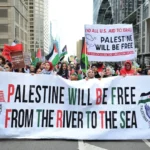
The Evolution of Identity: Zionism’s Influence on Israeli Education
The Middle East is shaped by a complex history of Zionism, the Holocaust, and the ongoing Israeli-Palestinian conflict. Professor Dr. Nurit Peled-Elhanan examines the cultural and political aspects of education in her book, *Palestine in Israeli School Books: Ideology and Propaganda in Education*. In a recent episode of the Book Cafe podcast, Dr. Peled-Elhanan shared her profound insights into how these elements shape Israeli education and identity.
The Rise of a “Jew with Muscles”
At the dawn of the Zionist movement, a transformative vision took shape: to create a “Jew with muscles.” This concept emerged as a counter to the perceived image of the diaspora Jew—seen as weak, spiritual, and effeminate. Zionists aspired to forge a new identity that embodied strength and resilience. The early Zionists in Palestine aimed to imitate the strength of Arab farmers by embracing the land and developing skills such as horseback riding and agriculture, which they had been denied in Eastern Europe.
This idealization, however, was not without its contradictions. Dr. Peled-Elhanan explains that initial admiration for Arab culture turned into a more complicated and often conflicting relationship. The desire to indigenize was overshadowed by the realities of political conflict and cultural hegemony.
Education as an Ideological Tool
Dr. Peled-Elhanan’s research delves into the portrayal of Palestinians in Israeli schoolbooks, revealing a narrative steeped in ideology and propaganda. The educational discourse in Israel, she argues, is deeply intertwined with the nation’s historical traumas, particularly the Holocaust. The Holocaust, she asserts, is a cornerstone of Israeli identity, more influential than Zionism or Judaism itself. It is presented as a perpetual threat, with the Arabs cast in the role of potential exterminators.
This educational framework fosters a sense of eternal victimhood and justifies a stance of strength and domination. The narrative is reinforced through graphic depictions of Holocaust atrocities, instilling fear and a desire for revenge in young minds. Dr. Peled-Elhanan emphasizes that this education affects psychological perceptions, often leading to hostility towards Palestinians instead of addressing the historical sources of Jewish suffering.
The Complex Identity of Israeli Jews
The Zionist project also entailed the creation of a unified Jewish identity, which involved the suppression of diverse cultural heritages. Dr. Peled-Elhanan examines how Mizrahi (Arab) Jews faced discrimination from the Ashkenazi (European) Jewish community upon their immigration to Israel. This racial divide was exacerbated by efforts to de-Arabize Mizrahi Jews, stripping them of their language and cultural identity.
The treatment of Ethiopian Jews serves as a striking illustration of internal colonialism. Forced to assimilate into a Westernized Israeli identity, they encounter systemic racism and marginalization. Dr. Peled-Elhanan compares these experiences to those in other settler colonial societies, where indigenous and minority cultures are frequently suppressed.
Language as a Cultural Battleground
Language plays a pivotal role in shaping national identity. In Israel, Hebrew was revived as a unifying language, overshadowing the multitude of languages spoken by Jewish immigrants. Dr. Peled-Elhanan describes how Hebrew was imposed as the only official language, pushing Arabic to a secondary role, despite the large Arab population.
This reflects the challenges in places like Bangladesh, where language is vital for national identity and resistance. Imposing a single language can lead to cultural domination and diminish linguistic diversity.
A Call for Global Solidarity
Dr. Peled-Elhanan stresses the importance of external pressure, especially from the U.S., to change Israeli policy due to significant American financial support. She urges countries from the Global South to speak out against the injustices of the Israeli regime, calling for a broader international response.
Her insights highlight that meaningful change often needs a global effort that goes beyond borders and challenges existing power dynamics.
Conclusion: Towards a More Inclusive Future
Dr. Peled-Elhanan’s book and discussions provide a strong critique of the ideologies influencing Israeli society and education. It encourages us to rethink the stories we believe and the identities we create, promoting inclusivity and understanding.
These insights highlight the importance of education in shaping views and its role in promoting a fairer, more equitable world. Let us strive to build bridges of understanding, acknowledging the diverse identities that enrich our global community.
We encourage you to explore Dr. Peled-Elhanan’s work and engage in discussions that challenge and inspire you. Together, we can work towards a future where education serves as a beacon of hope and reconciliation.
For more insights and an engaging discussion, check out the full podcast episode featuring Dr. Nurit Peled-Elhanan on the Book Café Podcast.
This article was created by AI and draws from a podcast episode on the YouTube channel “Book Café Podcast.”









